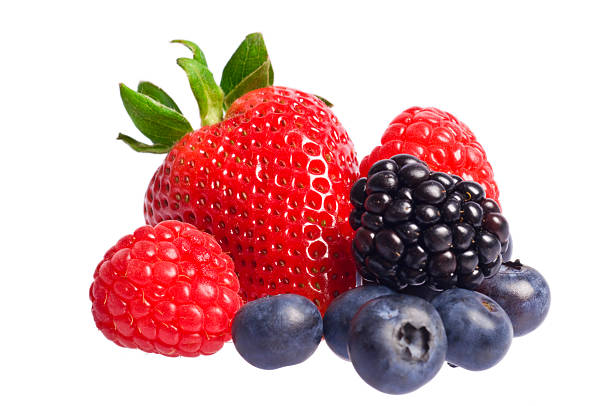The Secret to Heart Health by Consuming Berries
Important Nutrient Content in Berries for the Heart
Berries, such as blueberries, strawberries and raspberries, are known to be rich in important nutrients that support heart Health. One of the main components is antioxidants which play a role in fighting free radicals in the body. These antioxidants, especially anthocyanins, help reduce inflammation and protect blood vessel cells from damage.
Apart from that, berries also contain high fiber. Fiber has an important role in reducing bad cholesterol (LDL) levels in the blood. By consuming berries regularly, the risk of blocked arteries due to cholesterol buildup can be reduced, which directly helps maintain heart health.
Berries are also a good source of vitamin C, which helps maintain blood vessel elasticity and improves immune system function. This vitamin is important for preventing cholesterol oxidation in the blood vessels, which can cause heart disease.
In addition, the potassium content in several types of berries, such as raspberries, plays a role in regulating blood pressure. Potassium helps counteract the effects of sodium, which is known to be a major cause of high blood pressure. Eating berries can help keep blood pressure stable.
Not only that, the folate contained in berries also has an important role in maintaining heart health. Folate helps reduce levels of homocysteine, an amino acid high in the body that can increase the risk of heart disease.
Overall, the combination of antioxidants, fiber, vitamins and minerals in berries makes them a very beneficial fruit for maintaining heart health and preventing various cardiovascular problems. Berries can be a delicious and healthy addition to your daily diet.
Types of Berries that are Best for Heart Health
Berries are a group of fruit that are known to have extraordinary benefits for health, especially the heart. Here are some types of berries that are best for supporting heart health:
- Blueberries
Blueberries are rich in antioxidants, especially anthocyanins, which help protect the heart from free radical damage. Regular consumption of blueberries can help lower blood pressure and reduce the risk of heart disease. - Strawberries
Strawberries contain high levels of vitamin C and fiber which are beneficial for heart health. The fiber in strawberries helps lower bad cholesterol (LDL) in the blood, while vitamin C strengthens blood vessels and improves blood circulation. - Raspberries
Raspberries are an excellent source of fiber, important for keeping cholesterol at healthy levels. Apart from that, raspberries also contain potassium, which helps lower blood pressure and prevent heart disease. - Blackberry
Blackberries are rich in fiber, vitamin K, and antioxidants, all important for maintaining optimal heart function. The vitamin K in blackberries helps prevent hardening of the arteries which can increase the risk of heart attack. - Cranberries
Cranberries are well known for supporting heart health by helping lower cholesterol levels and improving blood vessel function. The antioxidant content in cranberries also helps reduce inflammation, a major factor in cardiovascular disease.
These types of berries provide extraordinary benefits for heart health through a combination of healthy nutrients. Consuming it regularly can be a simple way to maintain heart health naturally.
The Role of Fiber in Berries in Lowering Cholesterol
Berries are famous not only for their fresh taste, but also for their high fiber content. Fiber plays an important role in lowering cholesterol, thereby helping maintain heart health. The following is an explanation of how the fiber in berries works in the body to lower cholesterol levels:
- Binds Cholesterol in the Intestine
The soluble fiber found in various types of berries, such as raspberries and blackberries, helps bind cholesterol in the intestines. This fiber absorbs bad cholesterol (LDL) and prevents it from being absorbed into the bloodstream, which ultimately helps lower cholesterol levels in the body. - Increases cholesterol output
The fiber in berries also helps increase cholesterol excretion through feces. By consuming foods rich in fiber, the body is more effective in eliminating excess cholesterol, thereby reducing the risk of plaque buildup on artery walls. - Reduces Cholesterol Production in the Liver
Apart from reducing cholesterol absorption, the fiber in berries can also help reduce cholesterol production in the liver. This process occurs when fiber stimulates the production of bile acids, which require cholesterol as a raw material. Thus, the liver will use more cholesterol from the blood to produce bile acids, reducing the amount of circulating cholesterol. - Supports Good Cholesterol Balance
Apart from lowering bad cholesterol, the fiber in berries helps increase good cholesterol (HDL) levels. Good cholesterol helps transport bad cholesterol from the blood vessels to the liver for elimination, thereby maintaining a healthy balance in the body.
With their important role in lowering cholesterol, consuming berries regularly can support heart health and prevent various cardiovascular diseases.
Control Blood Pressure with Regular Consumption of Berries
Regular consumption of berries has been proven to have a positive effect in controlling blood pressure. Fruits such as blueberries, strawberries and raspberries are rich in nutrients that can help maintain blood pressure within normal limits.
One of the key components in berries is antioxidants, especially anthocyanins, which give these fruits their bright color. Research shows that anthocyanins can improve blood vessel health, help maintain their elasticity, and reduce inflammation. With healthier blood vessels, blood flow becomes smoother, which has a positive impact on blood pressure.
Berries are also rich in fiber, which plays an important role in regulating blood pressure. Fiber helps lower cholesterol levels, which can indirectly help maintain blood pressure. Additionally, fiber supports a healthy digestive system and helps control weight, factors that also contribute to healthy blood pressure.
The potassium content in berries, such as raspberries and strawberries, also plays a role in controlling blood pressure. Potassium helps neutralize the effects of sodium in the body, which is known to be the main cause of hypertension. By increasing our potassium intake from berries, we can help lower blood pressure and support heart health.
In addition, consuming berries rich in vitamin C can help strengthen blood vessels and improve blood circulation. Vitamin C also plays a role in preventing cholesterol oxidation, which can cause blocked arteries.
Integrating berries into your daily diet can be a delicious and healthy way to control blood pressure and maintain overall heart health.




